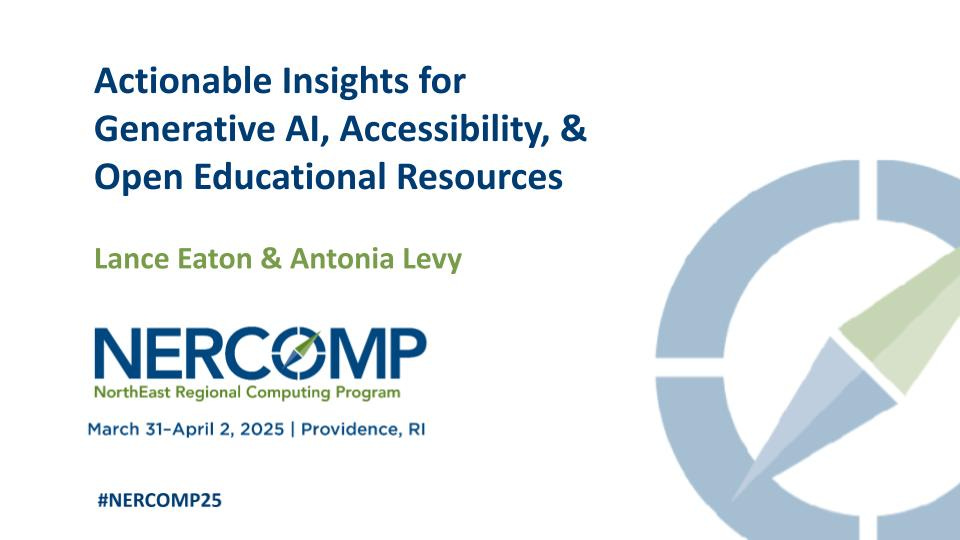Blending AI, OER, and UDL
Actionable Insights for Generative AI, Accessibility, & Open Educational Resources
Last week, we had the opportunity to present at NERCOMP on a project we’ve been working on, Actionable Insights for Generative AI, Accessibility, & Open Educational Resources. This workshop session was focused on engaging folks about the interesting and potentially powerful intersection of generative AI, open educational resources (OER), and universal design for learning (UDL).
Given that CAST released the UDL 3.0 guidelines last summer, we found it a perfect opportunity to bring these three elements together. Our goal for the session was to foster a conversation about the ways these might work together and what that might unlock. Our prompts inspired a rich discussion that included us sharing our own framework for thinking about this topic as well as getting participants to engage with a few scenarios we had created.
Sharing Is Caring (And OER + UDL Friendly!)
While there is a bigger piece we are writing, we wanted to share our resources and slides with others, in hopes of spurring more conversations about how these concepts might fit together. Here are the slides and the handout, which includes the scenarios as well as a list of additional resources.
What We’re Thinking
We know that this terrain is loaded with concerns and challenges, particularly about how AI is created, where its generative materials come from, and the problems of its outputs. All of that remains true and we continue to think about how we might mitigate or navigate these concerns (and how some may be resolved through other means).
While being mindful of these challenges, we see the following emerging structure that’s informing our thinking about what the possibilities and challenges for combining these three concepts are:
First, they have complementary strengths. OER provides the framework for sharing and reproducing freely. GenAI opens up the possibilities to scale content creation and revising potential. Taken together, these turbo-charge how you can make UDL more possible throughout a course, a curriculum, and an institution.
We’re thinking about UDL as the prism through which learning materials and experiences are developed with the support of GenAI, plus the use of flexible licensing to make them readily available as OERs This allows us to consistently build out multiple means of representation (the "what" of learning), action and expression (the "how" of learning), and engagement (the "why" of learning). But that’s the building part; there is also the other side of the equation–reviewing the content. Here, we bring UDL back again to assess and determine where it does and doesn’t effectively work for our students.
One place we found some interesting answers is the MIT AI + Open Education Initiative, which has nine real-life use cases to explore. As we continue to work, we are hoping to find other examples and case studies to inform our thinking.
Some Things Learned
During the discussion with participants at NERCOMP, we realized each of these three ideas can serve as an effective gateway to the other two. For instance, someone already interested in OER can easily be introduced to UDL principles in the spirit of "open and accessible", and also shown how AI tools can help build out their OER projects. Similarly, for someone focused on UDL, OER can become an entry point for making learning materials free and include choice, while AI can help create more diverse materials and assessment options to support different learning needs.
There's a deep hunger for this topic and trying to figure it out while AI remains a moving target. Because of the concerns about legality, bias, and ethics, folks are interested but also understandably hesitant. What should be created, how should it be developed, who should be involved, and how do you communicate what you've done?
We hope to continue to explore, share, and write about this topic, so if you have any insights, examples, or sources to consider, we’d appreciate whatever you can share.
The Update Space
Upcoming Events, Sightings, & Shenanigans
EDUCAUSE Online Program: Teaching with AI. Facilitating sessions: April 7–18, 2025, April 28–May 9, 2025, June 23–July 3, 2025
Panelist with Nicole Allen & Robert Awkward, Ph.D. at the Open Ed in 2030: Exploring the Possibilities and Challenges Ahead of Us by Bridgewater State University on Monday, May 12th, 2025.
NERCOMP: Thought Partner Program: Navigating a Career in Higher Education. Monday June 2, 9, and 16, 2025 from 3pm-4pm (ET).
Recently Recorded Panels, Talks, & Conversations
Bristol Community College Professional Day. My talk on “DestAIbilizing or EnAIbling?“ is available to watch.
OE Week Live! March 5 Open Exchange on AI with Jonathan Poritz (Independent Consultant in Open Education), Amy Collier and Tom Woodward (Middlebury College), Alegria Ribadeneira (Colorado State University - Pueblo) & Liza Long (College of Western Idaho)
Reclaim Hosting TV: Technology & Society: Generative AI with Autumm Caines
2024 Open Education Conference Recording (recently posted from October 2024): Openness As Attitude, Vulnerability as Practice: Finding Our Way With GenAI Maha Bali & Anna Mills
AI Policy Resources
AI Syllabi Policy Repository: 165+ policies (always looking for more- submit your AI syllabus policy here)
AI Institutional Policy Repository: 17 policies (always looking for more- submit your AI syllabus policy here)
AI+Edu=Simplified by Lance Eaton is licensed under Attribution-ShareAlike 4.0 International







Congrats, a link to this post made it into OLWeekly (the best newsletter)!
What a great session! I will be sharing the information as we are now revamping many of our online courses with OER content. Making sure to use the UDL lens will greatly improve the courses for our diverse students. Thank you!